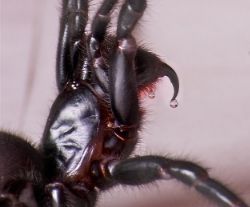Environment

Animals Threatened by Tar Sands Corporate Practice 
Enbridge tells America environmental concerns over Tar Sands spills are not their concern.
Antarctic Animals and Environmental Awareness 
The guardians of Antarctic's animals are industrialized nations whose primary focus is depleting Earth of all of its natural resources as quickly as possible, regardless of the consequences. This global protection tactic is as nonsensical as asking a serial killer to watch a child.
Back From the Future 
Scientists have been able to map out what life will be like in 2050 if human actions remain unchanged.
Can You Live Without the Support of Aquatic Life? 
Without a stable marine ecosystem, water is a resource people would have to forgo.
Clean Water for Healthy Animals 
Water is the only compound on Earth for sustaining life to exist in liquid, solid, and gaseous forms. Each of these naturally occurring conditions are vital to sustaining animal life.
Deer Ked Cause Moose Balding 
Changing weather patterns have increased the production of a parasitic fly that burrows so deeply it causes bald spots.
Emaciated Wildlife 
From the Atlantic to the Pacific, record-breaking numbers of wildlife are dying from starvation, but why.
Fossil Fuels Affect Core Aquatic Life 
Scientists have developed a method to measure the real consequences of oil spills. What was discovered surpassed worst expectations. The ground zero victims are plankton - the foundation necessary for all aquatic animals and water vitality.
Fracking Impact on the Planet and Animal Health 
Reports suggest that Mother Nature is not fracking around with animal, human health, or the planet. At some juncture, we must ask ourselves at what point does evidence of harm produce a definitive need for corrective action.
Growing Risk for Great Lakes from Tar Sands Spills 
Enbridge attempts to make a subtle play to push Tar Sands through unstable pipelines at the bottom of the Great Lakes in America.
How Clean Is the Water? 
The United States government seems contented to putrefy the pristine waters of the Arctic Region and America's last wild frontier in Alaska, endangering lawfully protected animals.
How Fungi Helps Ecological Stability 
Fungi, like mushrooms, are best known for their uses as a pizza topping, stylish hors d'oeuvre, or for their hallucinogenic properties. Research indicates that we can now add global stabilizer to that list.
Is an Oil Spill in the Arctic a Big Deal? 
If Shell Oil says they have a plan; why should people question it?
Preserving Bristol Bay Alaska 
With all of the legal protections afforded to this region, the global community should demand that the United States of America honor its ecological commitments and uphold its own preservation and environmental laws.
Saving Wildlife Equals Racism 
According to Chinese-American's, California's Shark Fin Ban is racist towards those of Chinese descent because they are largely the consumers of shark fins.
Tar Sands Destroys Lake Conway Wildlife 
Natural resources and wildlife covered in tar. Wildlife suffers rapid mutations and suffocation. Fertile land converts into uninhabitable soil, and access to fresh water supplies becomes increasingly threatened.
Tar Sands Extraction Mutates Animal Life 
Scientists have proven that oil sands extraction creates unnaturally accelerated mutations to marine life beyond the borders of the Tar Sands region.
The Hazards of Frankenfish 
Whether people choose to add fish to their diet or not, Frankenfish are an outright hazard to wildlife, the environment, and people.
The Importance of Rainforests and Animal Diversity 
Aggressive rainforest clearing causes extinction to animal life, tribal communities, and plant life necessary to sustain human existence.
The Weeping Spirit Bear 
The winds carry the tears of the Spirit Bears to take heed and end a tragedy that would bring back the Great Ice.
Top Ten Articles
Previous Features
Site Map
Follow @WildlifeWelfare
Tweet
Content copyright © 2018 by . All rights reserved.
This content was written by . If you wish to use this content in any manner, you need written permission. Contact Deb Duxbury for details.






